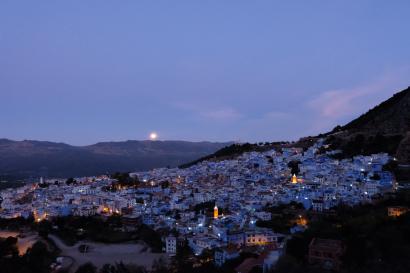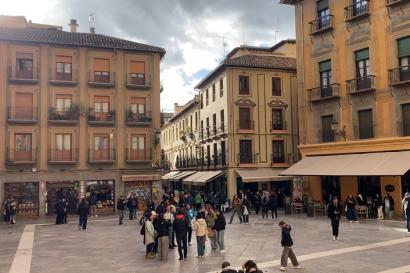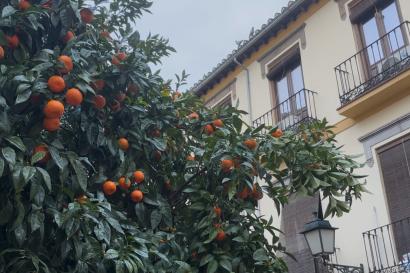I arrived in Spain a little less than two weeks ago. This morning, someone from the IES Abroad program recognized me from my blog, but other than that I am having quite a nice time here. I will recap the big events since the last time I posted, and then I’ll tell you about some important new words I’ve learned here.
On January 19th, I left the San Francisco airport for Málaga. I was quite scared to leave. All the fears I mentioned before seemed to grow and grow until finally I arrived and everything was overwhelmingly manageable. I watched A Star is Born and Rocketman on the plane.
We spent a couple of days in Málaga and then took a bus ride to Granada on the 23rd of January. My roommate and I met our host family (more later) and moved into our new rooms. We had orientation classes twice a day for a week and a half until today, when we started our regular classes. This weekend, we are going to Seville.
I can tell that my Spanish is improving because I’m able to understand more and more of the world around me. However my speaking abilities are lagging far behind my listening abilities. Still, I have learned many words here so far, and I’d like to share a few important ones.
Muestra
This is one of the first words I learned. Soon after we arrived at our new home, three of my host parent’s grandchildren came rushing in to play. At first I thought they came specifically to meet us, but I soon learned that they live two floors down from us and they come over at least every day to be with their grandparents. They aren’t shy; they’re so fun and sassy and dramatic and sweet. I instantly felt at home, as their craziness reminds me of the kind I witness whenever my cousins get together. One is 10, another is 7, and the youngest is 5 (I don’t think I should use their names so I’ll just abbreviate). Anyways, when they got here they started passionately playing a card game. My roommate and I tried to learn the game, but it seemed complicated. They kept pointing to a perpetually upturned card and saying “la muestra.” We eventually understood: the muestra is the “trump” card. Now, my roommate can play without help and can even win every once in a while. (NOTE: muestra literally means “sample” or “sign.” Triunfo is also a spanish word for trump, but this is not my host grandchildren’s chosen term.)
Llena/o
This word means full. As in, “I’m full, please stop offering me more food.” We learned this word the first time we ate lunch with my host mom. She is an excellent cook, and I am a pretty good eater, but after seconds of lunch I was stuffed. We mimed a big stomach and asked her how to say that we were full, and it was a word I was careful not to forget. In Spain, meals are really important. At school, sometimes I eat while watching Netflix or while walking to class. No one would think to do such a thing in Spain, as meals are intimate times that should be spent with family. Lunch is the largest meal of the day. All the shops are closed during lunchtime. We eat for about an hour and a half, and sometimes we sit there for longer to watch the news or chat. More often than not, I fall asleep on the couch for my little siesta, while the news plays.
Tinto de Verano
This is the chosen drink of many an IES Abroad Granada student. It’s about ⅔ red wine, ⅓ sparkling lemonade. It’s refreshing, not too strong, and they have it at every tapas bar in the city. The night life here in Granada is really fun. Our program provides us with breakfast and lunch, but we students are on our own for dinner. Luckily, almost every place in Granada gives you a free tapa with every drink you buy, even water. At a good tapas place, I only need two drink/snack combinations to be llena, so it could cost me as little as 4 euros. I appreciate how casual tapas culture is. It’s about spending lots of time talking with friends, snacking, laughing. It’s not about getting hammered as fast as possible, like parties in the U.S. sometimes feel like. I really love getting to see my friends every night. Oh yes I forgot to mention I have friends! My group consists of me, my roommate, her boyfriend, and a few amazing other women and men, all who I admire individually and adore together. I can’t believe I found people that are on the same wavelength as me. There’s even someone here who is going to be a midwife! What a niche interest that we share! Especially given that this was something I was most scared about, I am so surprised and grateful that it turned out this well.
Tío/Tía
This is the slang for “dude.” I don’t use this word too often (I’m not even cool enough to use heavy slang in English), but I’m including it to illustrate what orientation was like. When I learned about how long our orientation was, I envisioned hours of boring grammar lessons and struggling to stay awake. Instead, I had a style icon for a professor teaching us all about what’s cool, what’s lame, what the University of Granada students do for fun, and what we shouldn’t do unless we want to instantly be outed as Americans (like wear birkenstocks with socks). We had lessons on the current political situation in Spain, the religious demographics, and the local grocery stores. I felt way more prepared not just to live in Spain but to live as a hip, college student here. IES Abroad didn’t tell me to say this, seriously it was really helpful.
Acariciar (tu perro)
To pet (your dog.) My orientation professor taught us how to ask people if we can pet their dogs, as there are many dogs walking around the city. (I haven’t asked anyone yet because my dog Hazel gets upset when I pet other dogs, but I have admired them from afar.) The reason I chose this word is because I am running out of important new words and because I want to use this paragraph to quickly mention some basic cultural differences that I’ve observed. Please note that I am drawing conclusions based on what I’ve observed and experienced, but of course Spanish people are as unique and diverse as the citizens of any other country. First, apparently here the Spanish young people don’t usually ask to pet other people’s dogs. Also, people sometimes leave dog poop on the sidewalk, but the sidewalk gets regularly washed. People like to make small talk in the elevator. It is savvy to walk slowly, whereas people in cities in the US pride themselves on walking quickly. Spanish people talk about politics often and unabashedly. They eat lunch and dinner later here, and there are two breakfasts. Everyone, even old people, stay up late. Almost everything is closed on Sundays. People only turn on the shower water to rinse. And many bathrooms have a bidet that looks like a tiny sink.
Sometimes it can be hard to be so far away from my family and friends at home. I miss them. I miss some American comforts, like good Japanese food. And I face the pressure to have a “true” abroad experience unless I remind myself that I get to define my own abroad experience.
Signing off,
Grace

Grace Sells
My name is Grace Sells and I'm a junior at Carnegie Mellon University studying Global Studies and Art. I'm originally from San Jose, California, but now I'm studying in Pittsburgh Pennsylvania. In my free time I enjoy making art and spending time with friends and family. Fun fact: I never go to restaurants without asking my friends for a bite of their food.








